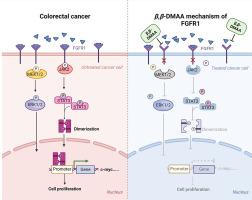当前位置:
X-MOL 学术
›
Phytomedicine
›
论文详情
Our official English website, www.x-mol.net, welcomes your
feedback! (Note: you will need to create a separate account there.)
Targeting FGFR1 by β,β-dimethylacrylalkannin suppresses the proliferation of colorectal cancer in cellular and xenograft models
Phytomedicine ( IF 6.7 ) Pub Date : 2024-04-25 , DOI: 10.1016/j.phymed.2024.155612 Ran Zhao 1 , Fanxiang Yin 2 , Mangaladoss Fredimoses 3 , Jianhua Zhao 4 , Xiaorong Fu 4 , Beibei Xu 4 , Mengrui Liang 4 , Hanyong Chen 5 , Kangdong Liu 6 , Mingjuan Lei 3 , Kyle Vaughn Laster 3 , Zhi Li 7 , Joydeb Kumar Kundu 8 , Zigang Dong 1 , Mee-Hyun Lee 9
Phytomedicine ( IF 6.7 ) Pub Date : 2024-04-25 , DOI: 10.1016/j.phymed.2024.155612 Ran Zhao 1 , Fanxiang Yin 2 , Mangaladoss Fredimoses 3 , Jianhua Zhao 4 , Xiaorong Fu 4 , Beibei Xu 4 , Mengrui Liang 4 , Hanyong Chen 5 , Kangdong Liu 6 , Mingjuan Lei 3 , Kyle Vaughn Laster 3 , Zhi Li 7 , Joydeb Kumar Kundu 8 , Zigang Dong 1 , Mee-Hyun Lee 9
Affiliation

|
Colorectal cancer (CRC) continues to be a major global health challenge, ranking as a top cause of cancer-related mortality. Alarmingly, the five-year survival rate for CRC patients hovers around a mere 10–30 %. The disruption of fibroblast growth factor receptor (FGFRs) signaling pathways is significantly implicated in the onset and advancement of CRC, presenting a promising target for therapeutic intervention in CRC management. Further investigation is essential to comprehensively elucidate FGFR1′s function in CRC and to create potent therapies that specifically target FGFR1. This study aims to demonstrate the oncogenic role of FGFR1 in colorectal cancer and to explore the potential of -dimethylacrylalkannin (-DMAA) as a therapeutic option to inhibit FGFR1. In this research, we employed a comprehensive suite of techniques including tissue array, kinase profiling, computational docking, knockdown assay to predict and explore the inhibitor of FGFR1. Furthermore, we utilized kinase assay, pull-down, cell proliferation tests, and Patient derived xenograft (PDX) mouse models to further investigate a novel FGFR1 inhibitor and its impact on the growth of CRC. In our research, we discovered that FGFR1 protein is markedly upregulated in colorectal cancer tissues, suggesting a significant role in regulating cellular proliferation, particularly in patients with colorectal cancer. Furthermore, we conducted a computational docking, kinase profiling analysis, simulation and identified that -DMAA could directly bind with FGFR1 within ATP binding pocket domain. Cell-based assays confirmed that -DMAA effectively inhibited the proliferation of colon cancer cells and also triggered cell cycle arrest, apoptosis, and altered FGFR1-mediated signaling pathways. Moreover, -DMAA effectively attenuated the development of PDX tumors in mice that were FGFR1-positive, with no notable toxicity observed. In summary, our study highlights the pivotal role of FGFR1 in colorectal cancer, suggesting that inhibiting FGFR1 activity could be a promising strategy for therapeutic intervention. We present strong evidence that targeting FGFR1 with -DMAA is a viable approach for the management of colorectal cancer. Given its low toxicity and high efficacy, -DMAA, as an FGFR1 inhibitor, warrants further investigation in clinical settings for the treatment of FGFR1-positive tumors.
中文翻译:

β,β-二甲基丙烯酰基烷宁靶向 FGFR1 可抑制细胞和异种移植模型中结直肠癌的增殖
结直肠癌(CRC)仍然是全球主要的健康挑战,是癌症相关死亡的首要原因。令人担忧的是,结直肠癌患者的五年生存率徘徊在仅为 10-30% 左右。成纤维细胞生长因子受体 (FGFR) 信号通路的破坏与 CRC 的发生和进展密切相关,为 CRC 管理的治疗干预提供了一个有希望的目标。进一步的研究对于全面阐明 FGFR1 在 CRC 中的功能并创建专门针对 FGFR1 的有效疗法至关重要。本研究旨在证明 FGFR1 在结直肠癌中的致癌作用,并探索 -二甲基丙烯酰基烷宁 (-DMAA) 作为抑制 FGFR1 的治疗选择的潜力。在这项研究中,我们采用了包括组织芯片、激酶分析、计算对接、敲低分析在内的一整套技术来预测和探索 FGFR1 的抑制剂。此外,我们利用激酶测定、pull-down、细胞增殖测试和患者来源的异种移植 (PDX) 小鼠模型来进一步研究新型 FGFR1 抑制剂及其对 CRC 生长的影响。在我们的研究中,我们发现 FGFR1 蛋白在结直肠癌组织中显着上调,这表明 FGFR1 蛋白在调节细胞增殖中发挥着重要作用,特别是在结直肠癌患者中。此外,我们进行了计算对接、激酶谱分析、模拟,并确定-DMAA可以直接与ATP结合口袋结构域内的FGFR1结合。基于细胞的检测证实,-DMAA 有效抑制结肠癌细胞的增殖,并引发细胞周期停滞、细胞凋亡和改变 FGFR1 介导的信号通路。 此外,-DMAA 能有效减弱 FGFR1 阳性小鼠 PDX 肿瘤的发展,且未观察到明显的毒性。总之,我们的研究强调了 FGFR1 在结直肠癌中的关键作用,表明抑制 FGFR1 活性可能是一种有前途的治疗干预策略。我们提出强有力的证据表明,用 -DMAA 靶向 FGFR1 是治疗结直肠癌的可行方法。鉴于其低毒和高效,-DMAA 作为一种 FGFR1 抑制剂,值得在临床环境中进一步研究用于治疗 FGFR1 阳性肿瘤。
更新日期:2024-04-25
中文翻译:

β,β-二甲基丙烯酰基烷宁靶向 FGFR1 可抑制细胞和异种移植模型中结直肠癌的增殖
结直肠癌(CRC)仍然是全球主要的健康挑战,是癌症相关死亡的首要原因。令人担忧的是,结直肠癌患者的五年生存率徘徊在仅为 10-30% 左右。成纤维细胞生长因子受体 (FGFR) 信号通路的破坏与 CRC 的发生和进展密切相关,为 CRC 管理的治疗干预提供了一个有希望的目标。进一步的研究对于全面阐明 FGFR1 在 CRC 中的功能并创建专门针对 FGFR1 的有效疗法至关重要。本研究旨在证明 FGFR1 在结直肠癌中的致癌作用,并探索 -二甲基丙烯酰基烷宁 (-DMAA) 作为抑制 FGFR1 的治疗选择的潜力。在这项研究中,我们采用了包括组织芯片、激酶分析、计算对接、敲低分析在内的一整套技术来预测和探索 FGFR1 的抑制剂。此外,我们利用激酶测定、pull-down、细胞增殖测试和患者来源的异种移植 (PDX) 小鼠模型来进一步研究新型 FGFR1 抑制剂及其对 CRC 生长的影响。在我们的研究中,我们发现 FGFR1 蛋白在结直肠癌组织中显着上调,这表明 FGFR1 蛋白在调节细胞增殖中发挥着重要作用,特别是在结直肠癌患者中。此外,我们进行了计算对接、激酶谱分析、模拟,并确定-DMAA可以直接与ATP结合口袋结构域内的FGFR1结合。基于细胞的检测证实,-DMAA 有效抑制结肠癌细胞的增殖,并引发细胞周期停滞、细胞凋亡和改变 FGFR1 介导的信号通路。 此外,-DMAA 能有效减弱 FGFR1 阳性小鼠 PDX 肿瘤的发展,且未观察到明显的毒性。总之,我们的研究强调了 FGFR1 在结直肠癌中的关键作用,表明抑制 FGFR1 活性可能是一种有前途的治疗干预策略。我们提出强有力的证据表明,用 -DMAA 靶向 FGFR1 是治疗结直肠癌的可行方法。鉴于其低毒和高效,-DMAA 作为一种 FGFR1 抑制剂,值得在临床环境中进一步研究用于治疗 FGFR1 阳性肿瘤。





















































 京公网安备 11010802027423号
京公网安备 11010802027423号